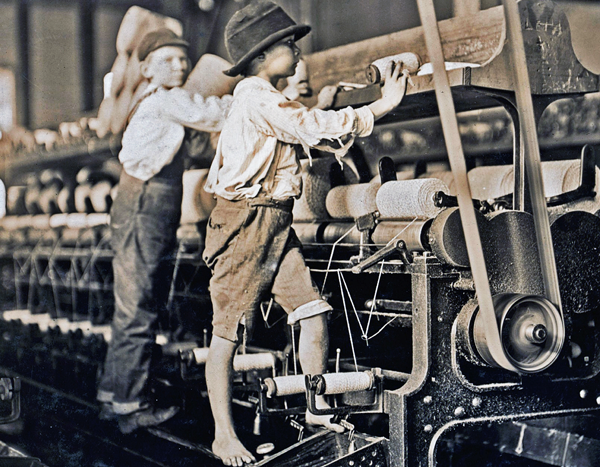Selective Forgetting? We All Exhibit Amnesia On Demand.
 |
Bureau of Labor Statistics
Child labor a thing of the past? No way. This research reveals
how almost all of us deal with this knowledge when it comes to
products we buy. And we're each guilty to one degree or another.
|
An interesting facet of the human mind - that might impact a story you're working on.
Jeans made with child labor? People choose willful ignorance
Consumers 'forget' when products have ethical issues
"Consumers not only forget the uncomfortable truth, but sometimes 'mis-remember'
the facts and believe that the offending product was made ethically."
Many consumers have found a way to cope with the knowledge that products they like have been made unethically: They simply forget they ever knew it. In a series of studies, researchers found that consumers conveniently "forgot" that brands of desks were made with wood from rain forests or that jeans may have been made with child labor.
In fact, consumers not only forget the uncomfortable truth, but sometimes misremember (sic) the facts and believe that the offending product was made ethically.
"It's not necessarily a conscious decision by consumers to forget what they don't want to know," said Rebecca Reczek, co-author of the study and associate professor of marketing at The Ohio State University's Fisher College of Business.
"It is a learned coping mechanism to tune out uncomfortable information because it makes their lives easier."
In one study, 236 college students were asked to read and memorize descriptions of six made-up brands of desks. The descriptions discussed quality, price and an ethical dimension -- the source of the wood. Participants read that the wood either came from sustainable tree farms or endangered rainforests.
When asked immediately after memorization, participants accurately recalled whether the wood came from rainforests or tree farms in 94 percent of the cases.
But those memories faded quickly. After the participants completed 15 to 20 minutes of tasks meant to distract them, they were then given a sheet of paper with all six desk brand names and were asked to write down as much as they could remember about each desk.
Participants were right 60 percent of the time about desks made from tree farms, but right only 45 percent of the time about desks made of rainforest wood.
"It is not that the participants didn't pay attention to where the wood came from. We know that they successfully memorized that information," said study co-author Daniel Zane, a doctoral student in marketing at Ohio State.
"But they forget it in this systematic pattern. They remembered the quality and price attributes of the desks. It is only the ethical attributes that cause people to be willfully ignorant."
A second study involved a national sample of 402 people who participated online. Here, participants were asked to put together an outfit that included a pair of jeans. About half of the participants saw a brand of jeans that was described as being made with child labor while the other half saw a brand of jeans made ethically, with no child labor.
Results were similar to the first study: People who saw the jeans made with child labor were much less likely to remember this information than people who saw a brand of jeans made with adult labor.
Why is forgetting ethical information so popular with consumers? Well, another study suggested that it makes people feel a little better about themselves.
In this study, the researchers had participants consider a hypothetical person named Chris who bought a pair of jeans made with child labor. In some cases, participants were told Chris had earlier learned that the jeans were made with child labor, but forgot when making the purchase. In other cases, participants were told Chris remembered the information, but ignored it when buying the jeans.
"What we found is that people judged the person who forgot the ethical information as more moral than the person who ignored the information," Reczek said.
"So, for most people, forgetting is seen as the more acceptable coping strategy."
If you really want to be an ethical consumer, there are steps you can take, Zane said.
"You need to realize that this memory bias exists and eliminate memory from your buying process," he said.
"Don't put something in your online shopping cart that you know was made unethically and say you'll think about it. By the time you come back, there is a good chance you will have forgotten what troubled you in the first place."
There's a lesson for ethical companies too, Reczek said.
"Don't make your customers rely on memory. Make sure you have reminders at the point of purchase that you're an ethical brand," she said.
Story Source: Materials provided by Ohio State University, original by Jeff Grabmeier. Rebecca Walker Reczek, Julie R Irwin, Daniel M Zane, Kristine R Ehrich. That’s Not How I Remember It: Willfully Ignorant Memory for Ethical Product Attribute Information. Journal of Consumer Research, 2017

Comments
Post a Comment